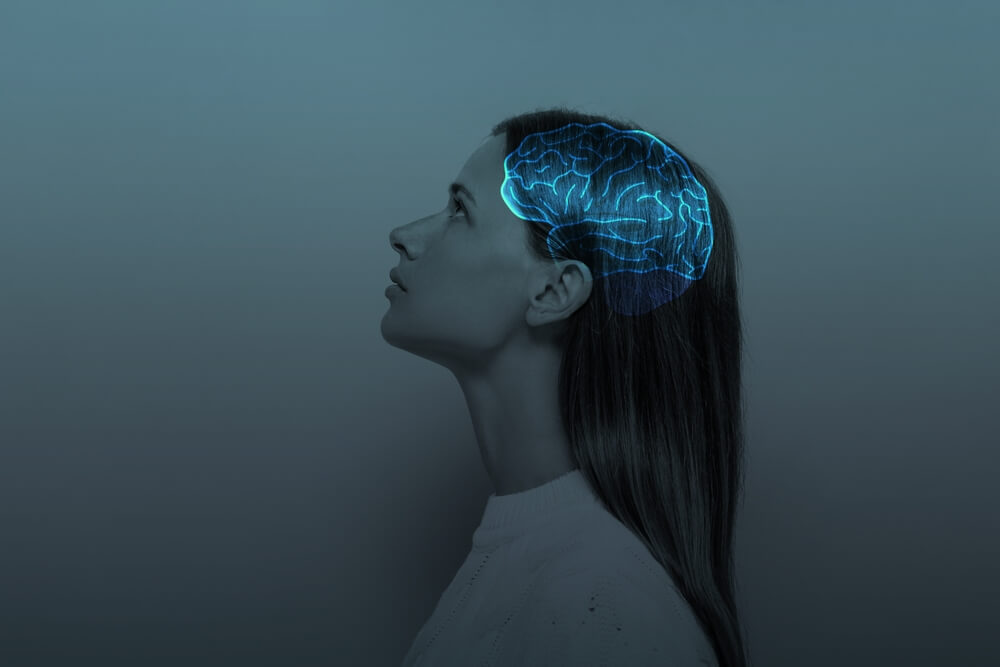
Understanding Post-COVID Brain Fog: Causes and Treatment Options


For many, brain fog has become a prominent, lingering symptom after a COVID-19 infection. While we all experience occasional cloudy thinking when tired or under the weather, post-COVID brain fog persists for weeks or months after the initial illness.
With passing, short-term instances of brain fog, you can simply rest and feel like yourself in no time. However, when people experience lasting brain fog after COVID, recovery is rarely as swift or straightforward; individuals can continue to struggle with brain fog six months to a year or more after having COVID.
The PD World’s Aviv Clinics team is here to help make this journey less daunting. We believe knowledge is power, so our goal is to educate you on post-COVID brain fog causes and treatment options. Use this to help carve a more confident path forward for you or your loved one.
As you’re reading through this, keep in mind:
- Each person has a unique experience with COVID-19.
- Speaking with a doctor is a critical first step to diagnosing long COVID.
- Per the CDC, long COVID has alternative names. “People call Long COVID by many names, including Post-COVID Conditions, long-haul COVID, post-acute COVID-19, long-term effects of COVID, and chronic COVID.”
This article covers:
- What Is Brain Fog?
- What Causes Post-COVID Brain Fog?
- Is Brain Fog a Symptom of Long COVID?
- Is My Brain Fog Related to COVID-19?
- How Long Does COVID Brain Fog Last?
- What Are My Options for COVID Brain Fog Treatment?
- Long COVID Brain Fog Treatment FAQ
What Is Brain Fog?

Brain fog is a term that describes slow or sluggish thinking. Someone with brain fog may experience confusion, forgetfulness, and/or a lack of mental clarity. While many cases of brain fog are temporary, with COVID-19, brain fog can impact cognitive functioning long-term.
Of course, brain fog can occur for many other reasons. If you experience brain fog symptoms unrelated to COVID-19, we encourage you to explore our blog, where you can discover possible treatment options and insights into managing this condition.
How Common Is Post-COVID Brain Fog?
Multiple reports illustrate those with long COVID experience a variety of symptoms that may include brain fog.
- One study notes that, among post-COVID patients, “80% reported having experienced brain fog.”
- Harvard Health notes that 22% to 32% of patients who recovered from COVID-19 “find they still have brain fog as part of their experience of long COVID.”
Not only does the research show how the COVID-19 virus can affect our cognition, but it also illuminates the fact that anyone—no matter their COVID-19 history—can experience persistent brain fog.
How Does Brain Fog Affect COVID Patients in Everyday Life?
Living with severe and persistent brain fog after COVID is undeniably difficult. Though “brain fog” may sound trivial, the reality is often far from easy. People who experience long COVID brain fog often face many challenges, including:
- Difficulty performing tasks effectively at work
- Trouble engaging in everyday activities
- Changes in friend and family relationships
- Feelings of frustration or isolation
- Negative impacts on their overall quality of life
Acknowledging the seriousness of this condition is an important first step in addressing its challenges and finding solutions to mitigate its symptoms.
What Causes Post-COVID Brain Fog?
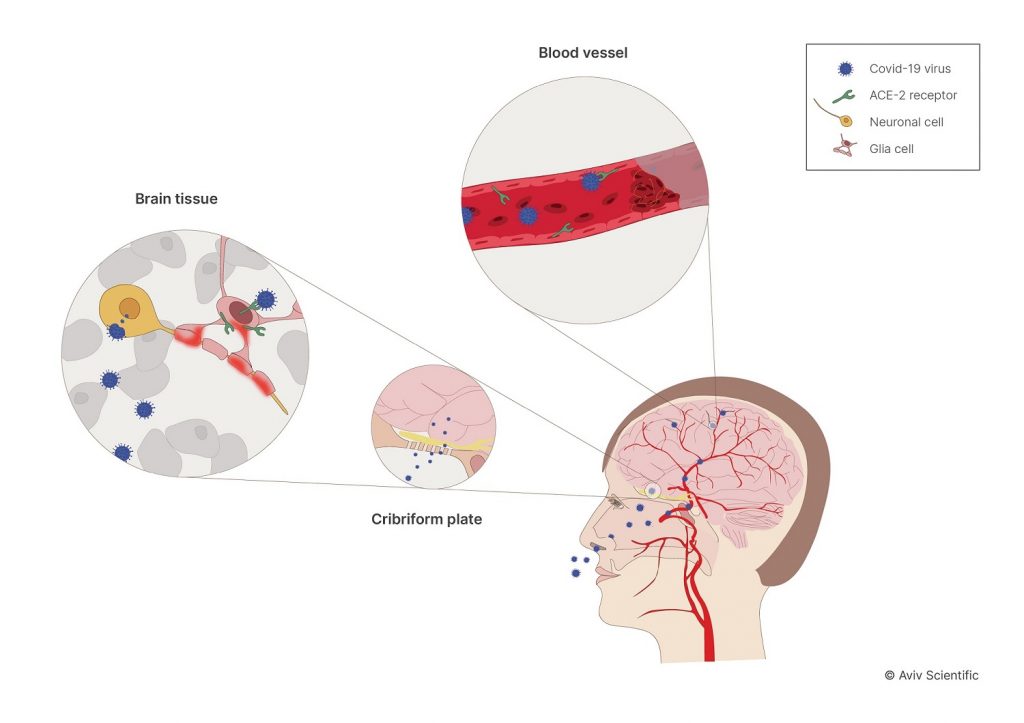
Stanford University School of Medicine researchers note brain fog from COVID-19 mimics the same cognitive issues caused by cancer chemotherapy (“chemo brain”). In both cases, excessive inflammation damages the brain cells and processes.
To better understand what goes on in cases of post-COVID brain fog, we can examine the link between:
- Where the COVID-19 virus attacks the brain
- How that impacted location in the brain affects long COVID symptoms
There are four main ways COVID-19 can attack the brain:
- Direct brain invasion: The virus travels through the nose and into the insula—a part of the brain involved in memory and executive function through its connection with the prefrontal cortex.
- Blood vessel injury: The virus may harm blood vessels that feed blood to the brain due to the “dysregulated cascade triggered by COVID-19 in the vascular system.”
- Dysregulated immune response: Damaged blood vessels caused by COVID-19 can slow the growth of cells, affecting the brain’s immune response.
- Cellular dysfunction: COVID-19 can trigger cell damage, “releasing pro-inflammatory factors.” This slows down the body’s response rate to infection, leading to high inflammatory conditions.
Is Brain Fog a Symptom of Long COVID?
Yes, brain fog is a common symptom of long COVID—the CDC lists brain fog under its neurological symptoms. Brain fog from COVID-19 doesn’t necessarily need to manifest on a severe level; it can be subtle.
One study notes participants who had COVID and didn’t notice any cognitive problems still performed poorly on attention and memory tasks. “Testing showed that performance on an attention task was not as good among the group that had COVID compared with those who did not.”
Is My Brain Fog Related to COVID-19?

If you notice your cognition has not been the same since your COVID-19 infection, we recommend speaking with a physician. Your body and health background are entirely unique from other people’s. Therefore, it’s important to discuss your lingering symptoms with a healthcare professional.
Any potential long COVID brain fog symptoms warrant a personalized evaluation. The certified physicians at Aviv Clinics assess the following five areas to diagnose long COVID. Walking through these five areas enables your physician to provide the holistic approach your health deserves.
- Physical symptoms: Fatigue, cough, loss of taste or smell, labored breathing, joint/muscle pain, etc.
- Cognitive and psychological symptoms: Brain fog, anxiety, depression, sleep disturbances, headaches, etc.
- Lung symptoms: Shortness of breath, chest pain/tightness, etc.
- Cardiac symptoms: Heart palpitations, elevated blood pressure, decline in oxygen saturation, etc.
- Changes in the brain: Physical damage to brain structure and metabolism evident from extensive brain scans
How Long Does COVID Brain Fog Last?
As everyone’s bodies are different, there’s no set time limit for brain fog after COVID. Some research studies indicate most patients recover within six to nine months, with others experiencing COVID brain fog symptoms for two years or more.
How long a person experiences brain fog after COVID may depend on:
- The severity of their initial infection
- Their overall health status
- Individual differences in brain function and resilience
- Their age at the time of infection
One study found that the aging brain may experience the consequences of a COVID infection even longer. When measuring cognitive changes in older COVID patients, researchers found “an increase in risk of longitudinal cognitive decline” a year after the acute phase of the infection.
What Are My Options for COVID Brain Fog Treatment?
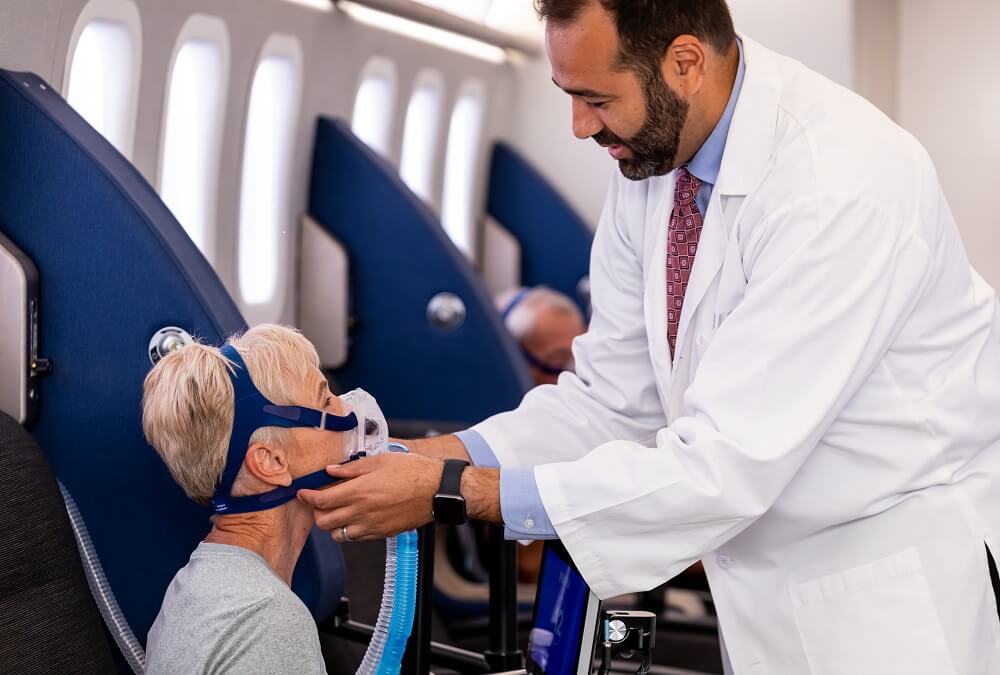
Rest assured—there are several ways to approach COVID brain fog treatment. The treatment options for long COVID brain fog should include activities and therapies that help address the root cause of symptoms.
Below, we offer tips on how you may be able to alleviate brain fog symptoms, including a unique evidence-based hyperbaric oxygen therapy protocol.
Addressing and Managing Brain Fog After COVID-19
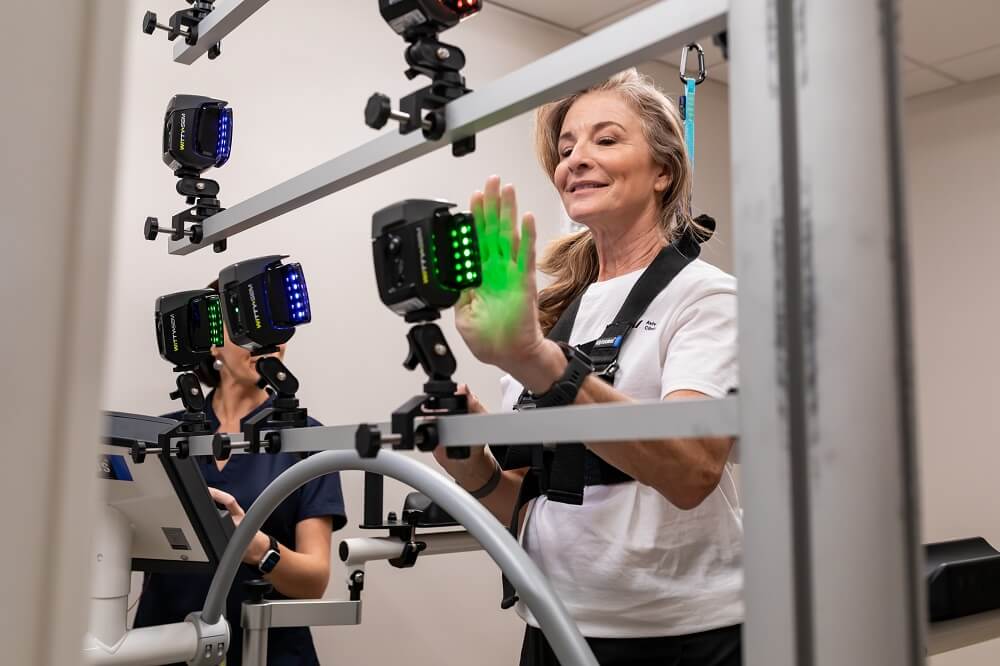
Managing brain fog involves engaging in activities known to improve memory and thought processes. These activities may include:
- Exercising. The CDC states, “Physical activity can help you think, learn, problem-solve, and enjoy an emotional balance.” Participate in regular cardio and strength training exercises each week. Walk, jog, jump rope, or do resistance-band or body-weight exercises. The key is to stick to something you enjoy to help you stay motivated. One note: Your exercise regimen should be supervised by a clinician familiar with your condition, as overexerting yourself can make your symptoms worse, not better.
- Getting adequate sleep. Getting adequate amounts of sleep “fosters attention and concentration, which are prerequisites for most learning.” The Sleep Foundation recommends seven or more hours of sleep for adults.
- Eating a well-balanced diet. Aim for the MIND diet, which encourages you to consume diverse healthy foods. Designed to enhance brain health and reduce the risk of neurological conditions, the MIND combines the Mediterranean and DASH diets.
Unique Hyperbaric Oxygen Therapy (HBOT) Protocol for Long COVID Symptoms
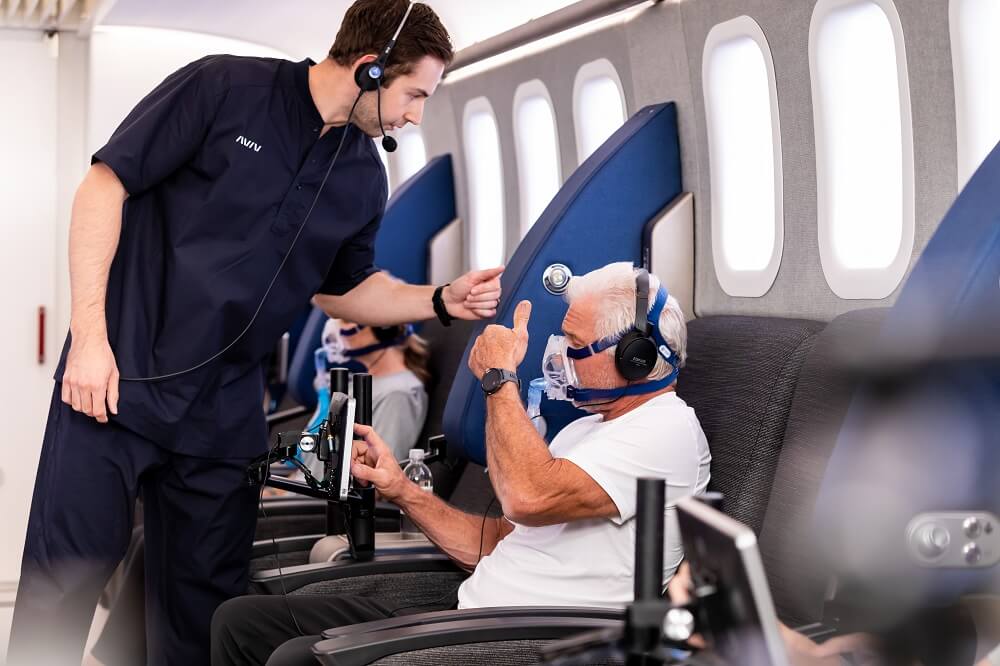
Multiple studies reveal that a specific hyperbaric oxygen therapy (HBOT) protocol may help mitigate long COVID symptoms as part of a comprehensive treatment program. The unique treatment incorporates a rise and fall in oxygen levels during the session, which initiates the body’s self-healing mechanisms.
From clinical and qualitative evaluations of HBOT patients, researchers conclude there is hope HBOT can address some of the common symptoms, such as fatigue and brain fog:
“Long COVID-related fatigue can be debilitating…The results presented here suggest potential benefits of HBOT, with statistically significant results.”
New research suggests these results are more than temporary, demonstrating that “improvements gained by HBOT are persistent even 1 year after the last HBOT session.” The study showed significant long-term enhancements in:
- Quality of life
- Quality of sleep
- Psychiatric symptoms
- Pain symptoms
These enduring improvements offer hope for long COVID patients looking for relief, pointing to the potential long-term benefits of HBOT in managing the condition’s challenging symptoms.
For Fleury, a long COVID survivor of more than two years, the potential for relief from persistent fatigue, discomfort, and brain fog after COVID was well worth the 4,500-mile journey from the Netherlands to the U.S.
The holistic Aviv Medical Program can incorporate an evidence-based hyperbaric oxygen therapy protocol as part of each client’s customized treatment plan. Aviv Clinics’ team of certified physicians takes a three-step approach to their long COVID program:
- In-depth medical assessment: Conducting comprehensive testing (physical, cognitive, and neurological) and brain imaging
- Tailored treatment program: Creating a customized treatment plan based on your test results
- Post-treatment assessment: Administering a second round of testing to unveil findings/progress and make recommendations for ongoing improvement
Learn more about DP World’s Aviv Clinics’ long COVID approach.
Long COVID Brain Fog Treatment FAQ
Here are the answers to some common questions about long COVID brain fog treatment options.
Are there any medications that can help with post-COVID brain fog?
There are no specific medications that are approved for treating long COVID brain fog, but some medications—including antidepressants, anti-anxiety medications, and cognition-enhancing medications—may be prescribed to address individual or related symptoms.
Are there lifestyle changes that can help manage post-COVID brain fog?
Several lifestyle changes that support overall health can help manage brain fog in COVID patients. These include regular supervised exercise, getting enough sleep, adequate nutrition, and stress management techniques such as meditation and mindfulness practices.
When should I seek medical attention for post-COVID brain fog?
It’s a good idea to seek a medical evaluation if you experience COVID brain fog symptoms that persist or worsen over time, especially if your symptoms interfere with your quality of life. Your healthcare provider can evaluate your symptoms, conduct tests or scans, and make recommendations for treatment or management based on your individual needs and goals.
If you experience persistent brain fog after COVID, Aviv Clinics can help. Our physicians offer a complimentary consultation call to answer any questions and discuss your options.
The Bottom Line
Brain fog from COVID-19 can be difficult to live with. If you or a loved one suspects COVID-19 has left lingering cognitive issues, contact DP World’s Aviv Clinics Dubai.
Our team will offer the resources you need to learn more about how our team of physicians helps manage long COVID symptoms. Feeling your best cognitively and physically starts with us.
Aviv Medical Program provides you with a unique opportunity to invest in your health while you age


